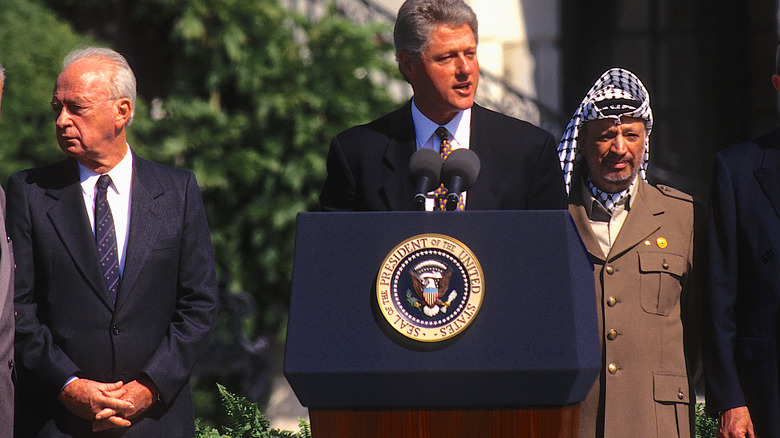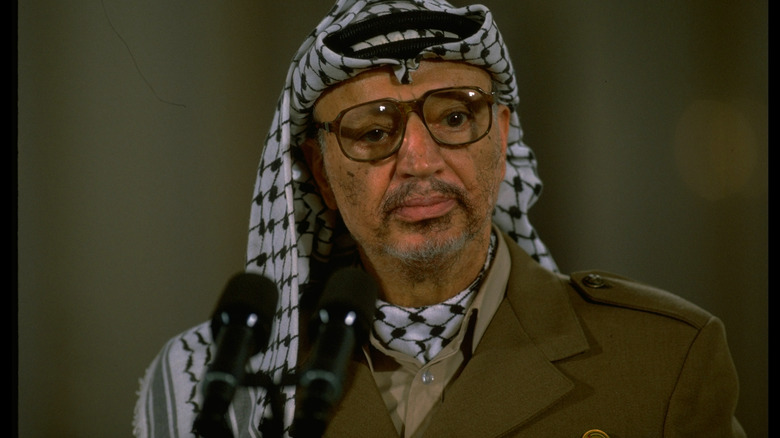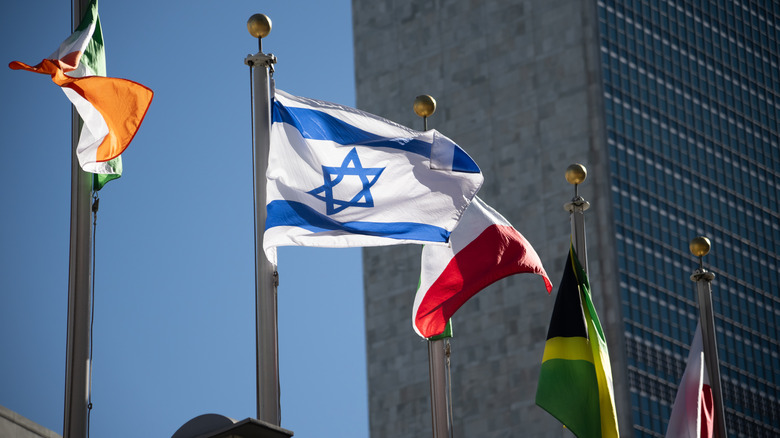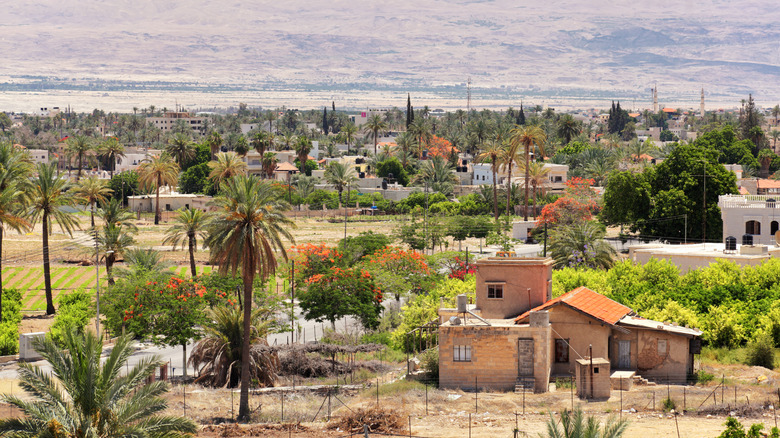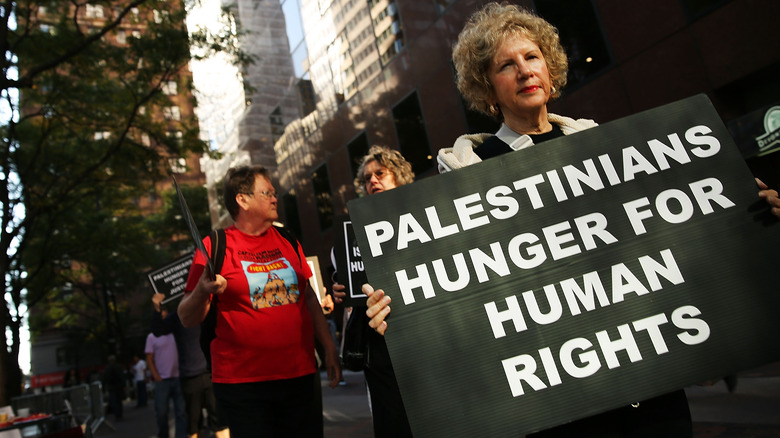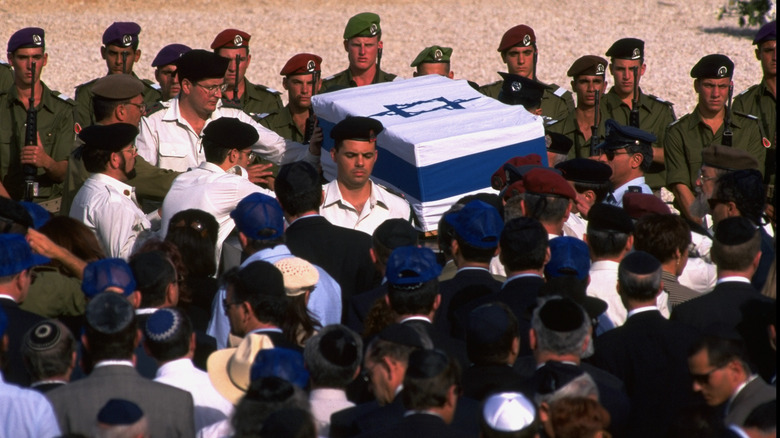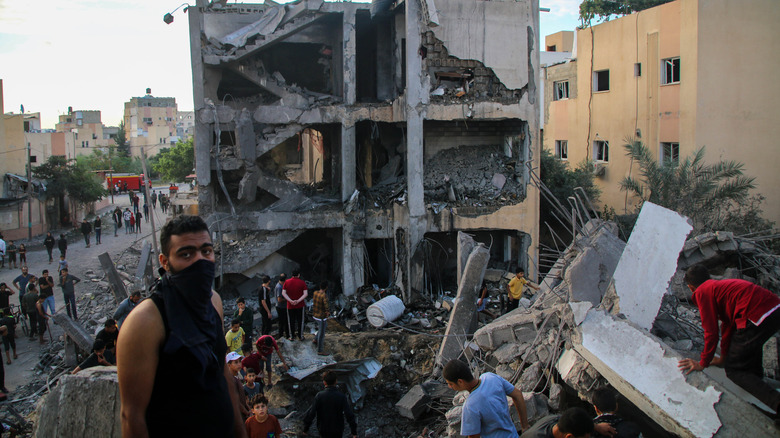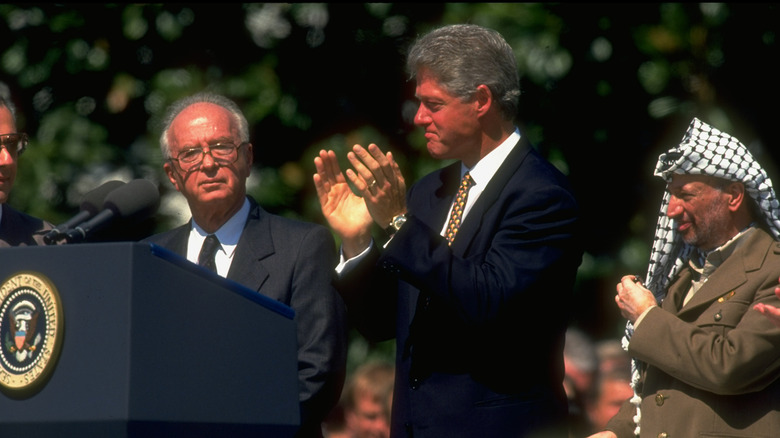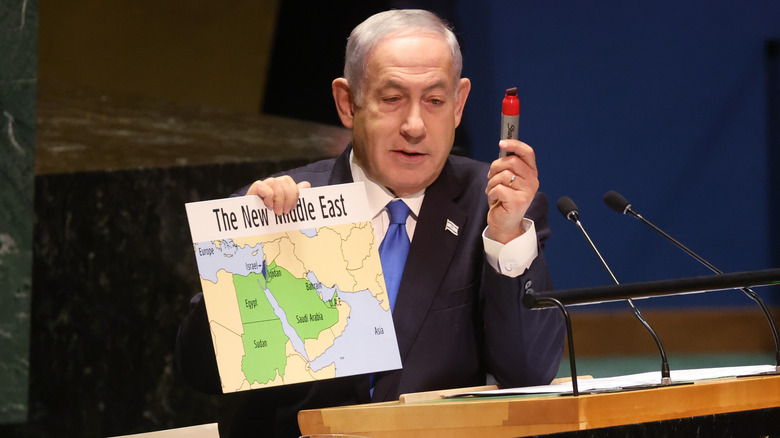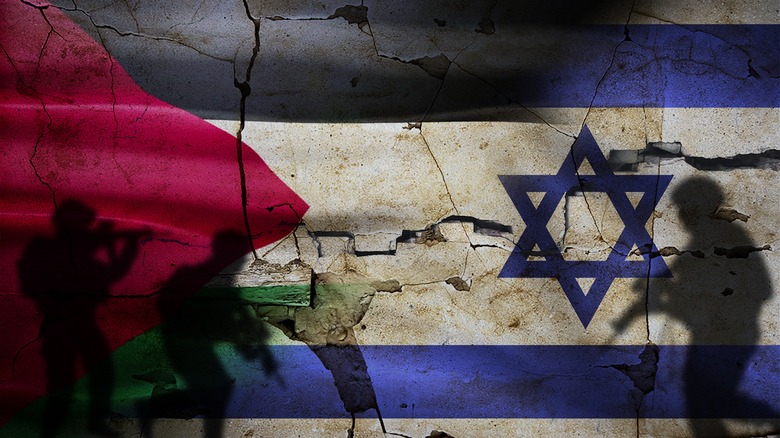The Untold Truth Of The Oslo Accords
Tensions have been building in Israel and Palestine for a long time, and when Israel declared war after Hamas organized a devastating terrorist attack that left hundreds dead, the world was shocked... but not really surprised. The videos and photos that started to make their way into social and mainstream media were terrifying, horrible, and the sort of thing that left no question that what was going to happen next was going to be swift, brutal, and bloody.
Exactly what happened is the kind of complicated story that's impossible to tell without several lifetimes of study, but in a nutshell, it's a conflict that kicked off in the post-World War II world, when the United Nations split the land between two groups of people who have never gotten along and thought everything was going to be fine.
Over the following decades, terrorist organizations started to form, backdoor politics raised more questions than answers, and not long after the 1987 formation of Hamas, other nations stepped in to try to encourage peace. Did it work? Absolutely not. The so-called Oslo Accords were negotiated in hopes of not immediately ending the violence, but at least laying the groundwork for peace. In a nutshell, they created the Palestinian National Authority and sectioned off pieces of the Gaza Strip and the West Bank to allow them to govern themselves, but in less time than it took to negotiate the accords, things fell apart in a big way. Here's what happened behind the scenes.
Palestine was left out of the pre-Oslo talks
The Middle East has always been an incredibly volatile area, and religion plays just a part of that. There's also the fact that it's strategically located at the nexus of Europe, Asia, Africa, and India, and then there's the rich natural resources, too. According to Avi Shlaim's text "International Relations of the Middle East," the conflicts that most immediately led to the establishment of the Oslo Accords went back to the Gulf War, continually terrible Arab-Israeli relations, and Iraq's removal from Kuwait. Palestine — and specifically the Palestinian Liberation Organization — had supported Iraq in the conflict, and because of that, they actually weren't included in the Middle East peace talks convened in Madrid in October of 1991.
They did end up going: They piggy-backed in with the delegation from Jordan, essentially sneaking in under what was a formal ban. Israel, meanwhile, not only attended, but made it clear that keeping control of ancestral Jewish lands was one of their biggest priorities.
Talks in Madrid essentially led to more talks: Israel was at the center of a series of negotiations with various other nations, but talks with Palestine perhaps predictably didn't go well. They were first held in the U.S., but it's also important to remember that at the time, Israel took the firm stance that Palestine should not be allowed to be an independent state. That led to representatives from both sides looking for a somewhat less official way to start talks. Enter: Oslo.
Initial talks were so secret that no records existed for a long time
The talks that laid the groundwork for the Oslo Accords were very small: Eight months, fourteen sessions, and just a handful of participants that included Israeli academics, a PLO treasurer, and representatives from Norway's government. They slowly started to expand: Not only were more people introduced to the process, but talks that had centered around economic policy also expanded into what was called a "declaration of principles," and that'll become important.
What, exactly, happened at those talks? Weirdly, no one's really sure. According to the Israel State Archives, even after unofficial talks became officially sanctioned, they were so secret that even the Israeli government doesn't have any real records of what went on there. It wasn't until decades later that one of the Israeli academics who took part, Dr. Yair Hirschfield, gave them his notes. Some of them were only published in 2022, but the vast majority of the documents remain classified.
Norway wasn't as neutral as it wanted to seem
In 1999, the government of Norway published a piece with the straightforward title of "Norway's involvement in the peace process in the Middle East." In it, they outlined in brief how they ended up becoming a part of the process, noting that in addition to always having "close, friendly relations with Israeli colleagues," they say that there was "also growing interest in the Palestinian cause." But, like pretty much everything about the Israeli-Palestinian conflict, it's not entirely straightforward.
Several months before Hamas's attack pushed Israel to a declaration of war, Columbia University professor of modern Arab politics and intellectual history Joseph Massad (via Middle East Eye) took a closer look at the relationship between Norway, Israel, and Palestine. Massad cited a series of decisions that seemed to suggest Norway was far from neutral, including their votes in favor of the partitioning of Palestine and Israel's entry into the United Nations. Then, there was the establishment of a Norwegian community in Israel (and on Palestinian land), at the same time shutting down immigration opportunities for Jews displaced by the war to settle in Norway.
He also quoted the first secretary general of the United Nations as making some particularly telling remarks. The Norwegian Trygve Lie described Israel as his "own baby," and was said to have passed top-secret military and diplomatic information to his associates in Jerusalem. By the 1980s, they were still refusing to officially recognize the PLO, so... not straightforward at all.
No one agreed on what the Declaration of Principles meant
The Oslo Accords weren't precisely a plan for peace, they were more sort of a blueprint that laid out the roadways that would have to be built in order to get to the proverbial Peace City. In 1993, representatives of Israel and the PLO signed the so-called "Declaration of Principles on Interim Self-Government Arrangements," and even though it was lauded as being a really big deal, it's possible to argue that it didn't do anything but cause more problems.
Why? At a glance, the agreement addressed things like what governmental authorities and what police forces would be in charge of areas that included Jericho (pictured), Gaza, and the West Bank. Here's the problem.
In order to get both sides to agree to sign the agreements in the first place, things had to be a little... left open to interpretation. According to the Israel State Archives, the Declaration of Principles was written in such a way that each side could interpret it in a way that was favorable to them. Take, for example, references to Jericho. That was going to Palestine, but after the fact, Palestine said that the entire district was included in the agreement. Israel, meanwhile, said they had only surrendered the city, and it was a difference that left around 275 km up-in-the-air. There were also disagreements about the wording of clauses that discussed security, border controls, and even the images that were going to be used on currency.
Here's why neither side was happy with the agreements
At the same time Palestine signed the Oslo Accords with the idea that it was going to be the first stepping stone to Israel's withdrawal from Palestinian territory, Israel looked at it sort of like the parents who were running to the store and leaving the kids home alone for the first time: "Let's see if they can manage to not burn their own house down."
Once word got out about the secret talks, Al Jazeera explained that people on both sides were skeptical. While some acknowledged that everyone was going to have to give up something if they ever wanted to meet in the middle, those on the right in Israel claimed that the negotiations were ultimately going to lead to Israeli Jews being kicked off land that they saw as being ancestrally theirs... not to mention the fact that the PLO was widely considered a terrorist organization, and there were plenty of people who didn't think a terrorist organization should be bargained with.
There was plenty of opposition from the other side, too, and a lot of it was actually pretty similar. Many Palestinians were worried that the agreement was skewed too far in the direction of being in Israel's favor, and one of their main concerns — getting back the land that (and this should sound familiar) they saw as being ancestrally theirs — was at risk of not happening. At the end of the day, no one was happy in the least.
It set events in motion that led to the assassination of Israeli PM Yitzak Rabin
One of the key architects of the Oslo Accords was Israeli Prime Minister Yitzhak Rabin. Two years after the Accords were signed, Rabin appeared at an event in Tel Aviv when he headed off-stage and was shot by a 25-year-old Israeli Jew named Yigal Amir.
It can be argued that the events leading up to the assassination really started with the far-right's reaction to the Oslo Accords. Not only did they declare Rabin a traitor, but he was also deemed a "rodef," which was defined in The Guardian as "a murder who, under Jewish religious law, could be killed to prevent further acts of murder." It was against that backdrop that Benjamin Netanyahu stoked the fires even more, continuing to condemn Rabin in spite of warnings from Israeli security forces.
Although the Los Angeles Times says Rabin had reportedly once instructed Israel's military to "break the bones of Palestinian inciters as punishment," the Oslo Accords painted him as someone who was willing to give up too much. Still, Professor Yosef Klausner, the doctor who tried to save Rabin recounted the night he died: "People started to cry. They sat on the floor, crying. Some of them loudly. Nobody knew him personally. It was as if they knew that this was going to affect their country, their life, their families. They were crying not only for the prime minister — they were crying for their fate."
No one really ever got behind them
There's extremists that enter pretty much any conversation: It is, after all, a world where people have come to blows over a chicken sandwich from Popeyes, so it sort of goes without saying that when the conversation turns to serious subjects that really do impact the lives of millions, there's a whole spectrum of opinions. The Oslo Accords should have rested on the shoulders of those middle-of-the-road people who know that a peaceful coexistence would have come with some give-and-take, but even the Israel State Archives says that in hindsight, even those people who were expected to get behind the Accords just, well, didn't.
Why? Because of those aforementioned extremists. The months surrounding the signing of the Oslo Accords were filled with violence, including events like the murder of Haim Mizrahi. He was an Israeli man who left behind a pregnant wife after he was stabbed, stuffed in the trunk of his car, and then set on fire by Palestinians on the chicken farm he was buying eggs from. His was just one of almost countless stories: Demonstrations and roadblocks turned violent, brutal killings took place on both sides, and a surge in terrorist activity led to more rioting.
That continued, too: According to "Sabotaging the Peace: The Politics of Extremist Violence," a series of bombs detonated by Palestinian extremist in 1996 — after the 1995 signing of the second part of the Oslo Accords — led to a complete breakdown of a peace process that many ordinary citizens supported.
Palestinian and Israeli architects were awarded the Nobel Peace Prize
The Nobel Peace Prize counts some pretty incredible people and organizations among their number, including Barack Obama, Doctors Without Borders, Nelson Mandela, The 14th Dalai Lama, and Elie Wiesel. In 1994, the prize was shared three ways, between Oslo Accords negotiators Yasser Arafat, Yitzhak Rabin, and Shimon Peres. They were being lauded for taking steps to bring peace to a traditionally violence-torn region of the world, but the award wasn't without irony.
Even as the honor was announced, The Washington Post reported that the West Bank — which had been held by the Israelis — was the site of some pretty shocking violence. An Israeli soldier was being held there, and a rescue attempt went terribly wrong and ended with the death of the captive soldier, along with four others involved in the rescue and the kidnapping.
It's also worth noting that there was some pretty heated debate on whether or not to include Arafat in the Prize. Norway's Kare Kristiansen resigned from the Nobel Prize Committee over it, saying, "Even if you forgive Arafat, that is not a reason to give him the prize. Not all sinners who confess are given the prize. His past is too filled with violence, terrorism, and bloodshed, and his future too uncertain to make him a Nobel Peace Prize winner... It will give the wrong signal to other violent organizations in the Middle East and other parts of the world."
Delays were blamed for a deadly massacre
For those living outside of the Middle East, it's both easy to see and difficult to imagine how stressful everyday life can be — especially when there's the potential for peace talks resting in the hands of just a few people. According to the Israel State Archives, a delay in talks between the 1993 and 1995 signings of the Oslo Accords was blamed by some as the catalyst that ignited tensions and led to the 1994 Cave of the Patriarchs massacre.
Just what happened is as complicated as anything else that goes on in the Israeli-Palestinian conflict: On February 25, a Kach extremist walked into the holy place — located in Hebron — and opened fire on Muslims gathered there for Ramadan worship. Twenty-nine were killed, 129 were injured, and as news spread, so did other riots and protests.
Here's where things get tricky. The cave is a holy site for Jews, once having belonged to Abraham — and it's where he and his descendants are buried. Fast forward about 3,000 years, and the site was seized by Muslims, a mosque was built, and Jews were forbidden. Post-war, it was still off-limits to Jews, until the IDF took the site in 1967. It's still a pilgrimage site of Muslims, hence, the conflict — and ultimately, a conspiracy theory that spread across Palestine that stated Israeli guards at the site stood by and let it happen.
This event spelled the end of potential success
In 2013, Oxford University professor Avi Shlaim took a look back (via The Guardian) about just what had happened to the hope that was brought by the Oslo Accords. In short, he acknowledged that he'd been wrong: They didn't pave the way for peace as so many people had hoped.
There were a few major things that happened that put an end to the prospect of peace, including the assassination of Israeli Prime Minister Yitzhak Rabin (and the rise of his replacement, Benjamin Netanyahu, pictured). Shlaim says that also to blame was the train wreck that was the 2000 Camp David Summit (or, as The Guardian called them, "a tragedy of errors,") and something called the second intifada. What's that?
Vox senior correspondent Zack Beauchamp explained that when talks between then-Israeli PM Ehud Barak and Palestine's Yasser Arafat turned ugly, protestors took the streets of Palestine, Israeli soldiers fired on them, and things descended into absolute chaos that led to a series of violent clashes that lasted for about five years. And that? That was the end of the hope that the Oslo Accords were going to have long-lasting impacts.
Why did they fail? They never had a chance
Hamas's brutal attacks and Israel's 2023 declaration of war came just weeks after the 30th anniversary of the signing of the Oslo Accords, so it's not entirely surprising that people were looking back and wondering just what happened. With the benefit of hindsight, it became kind of clear that the talks didn't have a chance from the very beginning, and according to Oxford University professor Avi Shlaim (via The Guardian), "the Oslo peace accords were wrecked by Netanyahu's bad faith."
He writes that one of the massive problems is that there was no mention of some of the major disputes that have guided Israeli-Palestinian relations for decades, particularly refugees' rights to land that they were displaced from in the post-war rulings, definite borders between Israel, Palestine, around the West Bank, and Gaza, and the fate of Jewish people living in Palestine. He didn't pull any punches when he observed: "It was worse than a charade: it provided Israel with just the cover it was looking for to continue to pursue with impunity its illegal and aggressive colonial project on the West Bank."
Others agree, with Al Jazeera noting that even from the beginning, the Oslo Accords were skewed to benefit Israel. That was summed up by Syracuse University professor of U.S. and Middle East history Osamah Khalil, who said, "Israel had no intention of agreeing to the emergence of a viable, contiguous, and independent Palestinian state."
